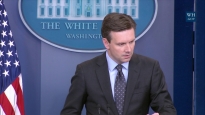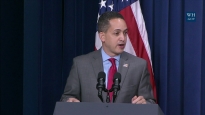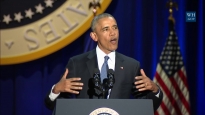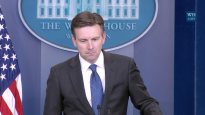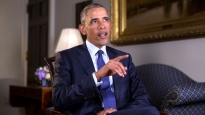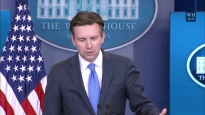President Obama Nominates Dr. Benjamin for Surgeon General
July 13, 2009 | 15:24
President Obama announces his nomination of Dr. Regina Benjamin for U.S. Surgeon General at the White House. The President outlines her extensive qualifications, and discusses her dedication to providing health care for her rural community despite facing adversity. Dr. Benjamin also gives brief remarks, explaining how she sees her role as Surgeon General. July 13, 2009. (Public Domain)
Download mp3 (14.1MB)
Remarks By The President In Announcement Of US Surgeon General
THE WHITE HOUSE
Office of the Press Secretary
___________________________________________________________________________
For Immediate Release July 13, 2009
REMARKS BY THE PRESIDENT
IN ANNOUNCEMENT OF
U.S. SURGEON GENERAL
___________________________________________________________________________
For Immediate Release July 13, 2009
REMARKS BY THE PRESIDENT
IN ANNOUNCEMENT OF
U.S. SURGEON GENERAL
Rose Garden
11:51 A.M. EDT
THE PRESIDENT: Good morning, everybody. Before I introduce America's next Surgeon General, I'd like to say a few words about our ongoing efforts to reform the health care system that she will help oversee.
We are now closer to the goal of health care reform than we have ever been. Over the last several weeks, key committees in the House and the Senate have made important and unprecedented progress on a plan that will lower costs, provide better care for patients, and curb the worst practices of the insurance companies. It's a plan that will not add to our deficit over the next decade. Let me repeat that: It is a plan that will not add to our deficit over the next decade -- and eventually will help lower our deficit by slowing the skyrocketing cost of Medicare and Medicaid.
Even though we are close, I've got no illusions that it's going to be easy to get over the finish line. There are going to be more debates and more disagreements before all is said and done. But health care reform must be done.
I know there are those who believe we should wait to solve this problem, or take a more incremental approach, or simply do nothing. But this is the kind of criticism we heard when the country tried to pass Medicare, a program that is now providing quality care to generations of American seniors. It's the kind of criticism we heard when we tried to pass the Children's Health Insurance Program, which has provided quality care and coverage to millions of kids. It's the same Washington thinking that has ignored big challenges and put off tough decisions for decades. And it is precisely that kind of small thinking that has led us into the current predicament.
So make no mistake: The status quo on health care is no longer an option for the United States of America. If we step back from this challenge right now, we will leave our children a legacy of debt -- a future of crushing costs that bankrupt our families, our businesses, and because we will have done nothing to bring down the cost of Medicare and Medicaid, will crush our government. Premiums will continue to skyrocket -- placing what amounts to another tax on American families struggling to pay bills. The insurance companies and special interests that have killed reform in the past will only continue to benefit even more -- and they'll continue to deny coverage to Americans with pre-existing medical conditions. People will continue to lose health insurance just because they lose their job or they change jobs.
This is a future that we cannot afford. This country can't afford to have health care premiums rise three times faster than people's wages, as they did over the last decade. We can't afford 14,000 Americans losing their health care every single day. We can't afford a future where our government will eventually spend more on Medicare and Medicaid than what we spend on everything else.
And during the campaign, I promised health care reform that would control costs, expand coverage, and ensure choice. And I promised that Americans making $250,000 a year or less would not pay more in taxes. These are promises that we're keeping as reform moves forward.
This is no longer a problem we can wait to fix. This is about who we are as a country. Health care reform is about every family's health, but it's also about the health of the economy.
So I just want to put everybody on notice, because there was a lot of chatter during the week that I was gone: We are going to get this done. Inaction is not an option. And for those nay-sayers and cynics who think that this is not going to happen, don't bet against us. We are going to make this thing happen, because the American people desperately need it.
And even those who are satisfied with their health care right now, they understand that if premiums keep on doubling and if employers keep on shedding health insurance because it's unsustainable and if you look at the trajectory of where Medicare and Medicaid are going, then inaction will create the biggest crisis of all.
And so I understand people are a little nervous and a little scared about making change. The muscles in this town to bring about big changes are a little atrophied, but we're whipping folks back into shape. We are going to get this done. And if there's anyone who understands the urgency of meeting this challenge in a personal and powerful way, it's the woman who will become our nation's next Surgeon General, Dr. Regina Benjamin.
The list of qualifications that make Dr. Benjamin an outstanding candidate to be America's leading spokesperson on issues of public health are long indeed. She was in the second class at Morehouse School of Medicine and went on to earn an MD from the University of Alabama at Birmingham and an MBA from Tulane. She served as Associate Dean for Rural Health at the University of South Alabama College of Medicine, and in 1995, she became the first physician under 40 and the first African American woman to be named to the American Medical Association's Board of Trustees. In 2002, she became President of Alabama's State Medical Association. And she has received numerous awards and recognitions, including the MacArthur Genius Award. It's very impressive.
But of all these achievements and experience, none has been more pertinent to today's challenges or closer to Regina's heart than the rural health clinic that she has built and rebuilt in Bayou La Batre -- did I say that right? Well, tell me how to say it.
DR. BENJAMIN: Bayou La Batre.
THE PRESIDENT: Bayou La Batre. That's in Alabama, people. (Laughter.)
Bayou La Batre is a rural town of about 2,500 people. It's a shrimping town, where a lot of folks work for themselves, scrape by, and can't usually afford health insurance. And by the way, Dr. Benjamin, while we were talking in the Oval Office, described for me the demographics of this town are actually very interesting, because you've got whites, blacks, and Asians in this community. There are a lot of Laotians and Cambodians who have moved there and are part of this shrimping town, so it's a diverse but very poor rural community. And like so many other rural communities, doctors and hospitals are hard to come by. And that's why, even though she could have left the state to make more money as a specialist or as a doctor in a wealthier community, Regina Benjamin returned to Alabama and opened a small clinic in Bayou La Batre.
When people couldn't pay, she didn't charge them. When the clinic wasn't making money, she didn't take a salary for herself. When Hurricane George destroyed the clinic in 1998, she made house calls to all her patients while it was rebuilt. When Hurricane Katrina destroyed it again and left most of her town homeless, she mortgaged her house and maxed out her credit cards to rebuild that clinic for a second time. She tended to those who had been wounded in the storm, and when folks needed medicine, she asked the pharmacist to send the bill her way.
And when Regina's clinic was about to open for the third time, and a fire burned it to the ground before it could serve the first patient, well, you can guess what Dr. Benjamin did. With help from her community, she is rebuilding it again. One disabled patient brought her an envelope with $20 inside. Another elderly man said simply, "Maybe I can help. I got a hammer."
For nearly two decades, Dr. Regina Benjamin has seen in a very personal way what is broken about our health care system. She's seen an increasing number of patients who've had health insurance their entire lives suddenly lose it because they lost their jobs or because it's simply become too expensive. She's been a relentless promoter of prevention and wellness programs, having treated too many costly and -- diseases and complications that didn't have to happen. And she's witnessed the shortage of primary care physicians in the rural and underserved areas where she works.
But for all that she's seen and all the tremendous obstacles that she has overcome, Regina Benjamin also represents what's best about health care in America -- doctors and nurses who give and care and sacrifice for the sake of their patients; those Americans who would do anything to heal a fellow citizen. Through floods and fires and severe want, Regina Benjamin has refused to give up. Her patients have refused to give up. And when we were talking in the Oval Office, she said: The one thing I want to do is make sure that this Surgeon General's Office gives voice to patients, that patients have a seat at the table; somebody is advocating for them and speaking for them.
And now we in Washington and across America have to refuse to give up on the goal of health care that is affordable and accessible for every last one of us. We don't have to deal with hurricanes and we don't have to deal with floods and we don't have to deal with fires; all we have to do is pass a bill to make sure that the American people have a decent shot at getting the kind of choice and high-quality health care that's affordable.
And I know that Dr. Benjamin is going to help us get there as the next Surgeon General. And I am truly honored to nominate her for that post, and Secretary Sebelius is equally excited, even though she's just standing here. (Laughter.)
With that, let me introduce the next Surgeon General of the United States, Dr. Regina Benjamin.
DR. BENJAMIN: Thank you, Mr. President. And thank you, Secretary Sebelius, for being here with me.
I am honored and I am humbled to be nominated to serve as United States Surgeon General. This is a physician's dream. But for me, it's more than just a job.
Public health issues are very personal to me. My father died with diabetes and hypertension. My older brother, and only sibling, died at age 44 of HIV-related illness. My mother died of lung cancer, because as a young girl, she wanted to smoke just like her twin brother could. My Uncle Buddy, my mother's twin, who's one of the few surviving black World War II prisoners of war, is at home right now, on oxygen, struggling for each breath because of the years of smoking.
My family is not here with me today, at least not in person, because of preventable diseases. While I can't -- or I cannot change my family's past, I can be a voice in the movement to improve our nation's health care and our nation's health for the future.
These are trying times in the health care field. And as a nation, we have reached a sobering realization: Our health care system simply cannot continue on the path that we're on. Millions of Americans can't afford health insurance, or they don't have the basic health services available where they live. I went back home to Alabama as part of my obligation to the National Health Service Corps. It's a program that provides underserved communities in America with qualified clinicians. The National Health Service Corps paid for my medical school education, and in return placed me in an area that desperately needed physicians, and I stayed.
So, in 1990, I founded the Bayou La Batre Rural Health Clinic in Alabama. And as a physician, my priority has always been the needs of my patients. I decided I would treat patients regardless of their ability to pay. However, it's not been a easy road. As has been explained, hurricanes destroyed my office and devastated our community. And for years I've worked to find resources to sustain a doctor's office that treats patients without health insurance or the ability to pay out of their pockets.
It should not be this hard for doctors and other health care providers to care for their patients. It shouldn't be this expensive for Americans to get health care in this country. And, Mr. President, thank you for putting health care reform at the top of your domestic agenda.
My hope, if confirmed as Surgeon General, is to be America's doctor, America's family physician. As we work toward a solution to this health care crisis, I promise to communicate directly with the American people to help guide them through whatever changes may come with health care reform.
I want to ensure that no one -- no one -- falls through the cracks as we improve our health care system. I will also work to shine a light on the inspiring work of the 6,200 members of the U.S. Public Health Service Commissioned Corps. These men and women serve on the front lines in the nation's fight against disease and poor health conditions.
I'd like to close by thanking two of my medical school professors. First, former Surgeon General, Dr. David Satcher, who instilled in me a passion for community medicine. As a medical student, he required me to go out into these small towns, spend time with rural physicians and participate in public health projects. Those experiences no doubt led me to open my practice in Bayou La Batre.
I must also thank former Secretary of Health and Human Services, Dr. Louis Sullivan. Dr. Sullivan was my dean and he taught me hematology. But more importantly, he taught me leadership. From him I learned how to impact policy at the federal, state, and local levels to help our patients and to help our community. I am indebted to both of my mentors.
And, finally, I'd like to thank my staff and my patients at our rural health clinic in Bayou La Batre. All of the work over the past 20 years have been for them and for patients like them, and today is no different. So thank you, Mr. President, for having the confidence in me. And if confirmed, I promise I will give you and the American people my best.
Thank you. (Applause.)
Q Mr. President, are you going to get more involved in health care? The senators say you ought to.
THE PRESIDENT: That was a good one, Bill. (Laughter.) We're going to get this done.
END
12:06 P.M. EDT
12:06 P.M. EDT
|
January 12, 2017
|
January 12, 2017
|
January 11, 2017
|
January 11, 2017
|
|
January 10, 2017
|
January 9, 2017
|
January 7, 2017
|
January 6, 2017
|
- &lsaquo previous
- 1
- 2
- 3
- 4
- 5
- 6
- 7
- 8
- 9
- …
- next &rsaquo

